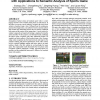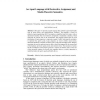112 search results - page 4 / 23 » Learning the Semantics of Manipulation Action |
ICML
1994
IEEE
13 years 11 months ago
1994
IEEE
Compositional Q-Learning (CQ-L) (Singh 1992) is a modular approach to learning to performcomposite tasks made up of several elemental tasks by reinforcement learning. Skills acqui...
ECAI
2004
Springer
14 years 1 months ago
2004
Springer
It is possible to model avatars that learn to simulate object manipulations and other complex actions. A number of applications may benefit from this technique including safety, e...
IROS
2009
IEEE
14 years 2 months ago
2009
IEEE
Abstract— We report on our experiences regarding the acquisition of hybrid Semantic 3D Object Maps for indoor household environments, in particular kitchens, out of sensed 3D poi...
MM
2006
ACM
14 years 1 months ago
2006
ACM
Recognition of player actions in broadcast sports video is a challenging task due to low resolution of the players in video frames. In this paper, we present a novel method to rec...
CLIMA
2010
13 years 9 months ago
2010
In this paper we present an agent language that combines agent functionality with an action theory and model-theoretic semantics. The language is based on abductive logic programmi...


